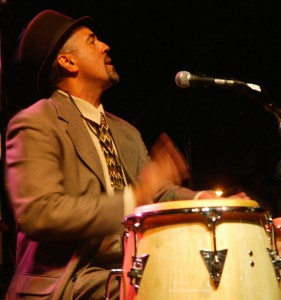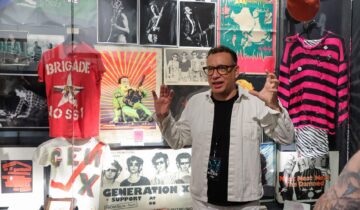 For SF WEEKLY: A conversation with John Santos is like sitting in on a dynamic college course on Afro-Latin music — but there are no lulls and no test afterward. Watch Santos perform live on conga drums with a full band of horn players, singers, and percussionists, and the history lesson becomes tangible and audible. You’re likely to hear traditional Cuban folk music, modern interpretations of well-known jazz compositions, mambo, and a lot more. He’s easy to spot onstage, too: Look for the signature goatee, short-brimmed hat, and conga drums decorated with the colors of the Puerto Rican flag.
For SF WEEKLY: A conversation with John Santos is like sitting in on a dynamic college course on Afro-Latin music — but there are no lulls and no test afterward. Watch Santos perform live on conga drums with a full band of horn players, singers, and percussionists, and the history lesson becomes tangible and audible. You’re likely to hear traditional Cuban folk music, modern interpretations of well-known jazz compositions, mambo, and a lot more. He’s easy to spot onstage, too: Look for the signature goatee, short-brimmed hat, and conga drums decorated with the colors of the Puerto Rican flag.
Santos, 58, curates a series of shows this year at the SFJAZZ Center in his role as resident artistic director, with two notable upcoming performances Feb. 8 and March 2. He’s a five-time Grammy-nominated native San Franciscan percussionist and composer with 35 years of Afro-Latin music under his belt: not just salsa and Latin jazz but myriad other musical styles with sub-Saharan and Pan-American influences. Santos has shared the stage with Dizzy Gillespie, Tito Puente, Max Roach, and countless others, which has helped turn him into a walking encyclopedia of standard and Latin jazz. He knows when to sound traditional and when to experiment. He’ll tune his drums nice and low for traditional Cuban folk songs, and crank them much tighter and higher for more breakneck tempos and louder volume.
In 1976, Carlos Santana hired a then 21-year-old Santos, who was then playing in a local salsa band called La Banda. Two weeks later, he was fired from Santana’s band for not having the necessary chops for the gig. “Carlos liked my energy, but I didn’t have the equipment to handle that gig at that time,” Santos says. “Then my band broke up, so I had no band to come back to. It’s been a very adventurous experience since.” Losing the Santana gig may have been a blessing in disguise, though. Santos soon formed the Machete Ensemble, which became a prominent Bay Area Latin jazz group, with a career spanning 21 years.
Santos has been affiliated with SFJAZZ for its entire 31 years. In his latest residency, he’ll perform eight concerts over the course of the year. “It’s a bit nerve-racking, actually,” Santos says. “It’s a lot of concerts to produce and rehearse, and prepare and pull it off.”
A residency at SFJAZZ may be stressful, but it’s a blessing for an artist like Santos. His eight shows will all be properly promoted, he and his musicians will be fairly compensated, and they’ll perform at a comfortable new venue with an enviable sound system. Santos is well aware that rising rents make it more and more difficult for jazz venues to survive and jazz artists to make a living. “Jazz and salsa and Afro-Cuban music are not commercial. They jumped on it for a minute during Buena Vista Social Club [Ry Cooder’s 1997 studio album and film about Cuban music], but then moved on to the next thing,” Santos says. “The people who truly love it treat it with respect and don’t abandon it. We keep the traditions moving forward in any way we can.”
Santos’ notoriety also stems from his work as an activist and teacher: When the National Academy of Recording Arts and Sciences eliminated many of its Latin music categories, including Latin jazz, from the Grammy Awards a few years ago, Santos urged fans to join a national boycott of the telecast. The next year, the Latin jazz album category was restored. He’s also lectured on the vast historical significance of drumming in Caribbean and Latin American music at San Francisco’s Museum of the African Diaspora, served on the Latin Jazz Advisory Committee of the Smithsonian Institute, and is on the faculty at the Jazz School Institute in Berkeley.
Santos could even be called the Wynton Marsalis of Latin jazz. Similar to the way in which Marsalis — the artistic director of jazz at the Lincoln Center in New York City and go-to spokesman on all things jazz — peppers his performances and lectures about jazz with sincerity and wit, Santos speaks about the larger Afro-Latin music diaspora with both earnestness and broad humor. Both men are leading figures in music on a global scale.
“Wynton and his education is a big inspiration for me,” Santos says. “The making of music and culture is about passing it down from one generation to the next. Half of what I do is teaching.”
Photo by Dennis Scherzer, courtesy of www.johnsantos.com/




A few years ago I’d have to pay someone for this inafimotron.